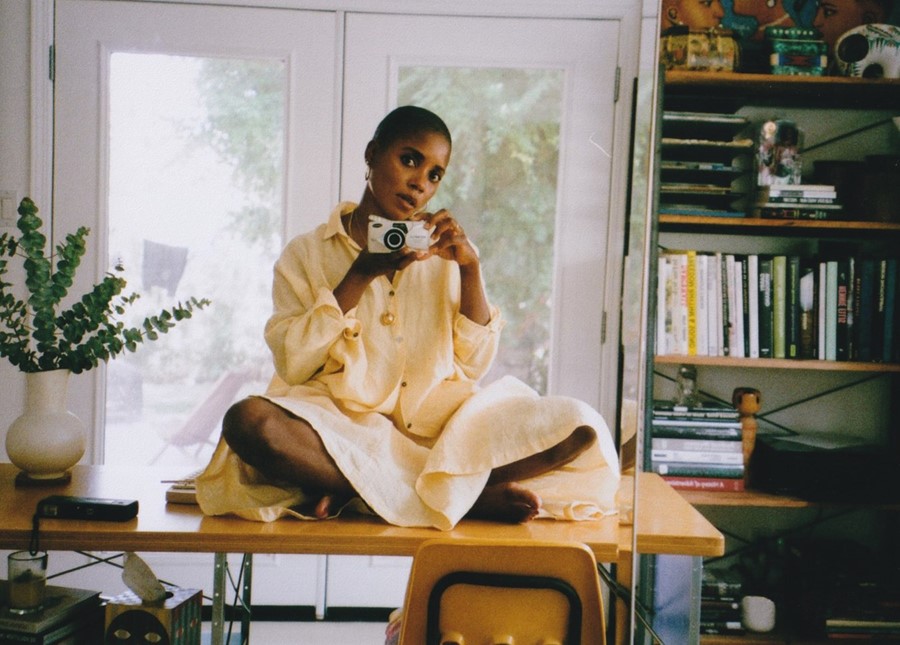“I kid you not, I held on to the last 40 pages for a full year because I didn’t want it to be over,” Bravo says of Gunn’s radically brilliant and largely overlooked book, Rhinestone Sharecropping
This article is taken from the Autumn/Winter 2021 issue of AnOther Magazine.
“Stressful comedy is my sweet spot,” says Janicza Bravo, the acclaimed director of multiple shorts and the Sundance-feted dramedy Lemon. Her newest film, Zola, is a case in point: based on a viral, 148-tweet thread, it details the true story of an impulsive road trip from Detroit to Florida taken by a Hooters waitress, an exotic dancer, her boyfriend and her pimp – a journey that veers spectacularly sideways. Zola masterfully captures the scrappy energy of Twitter and the queasy seepage between the digital and real world, finding absurdist humour in the worst of circumstances and beauty in the neon, tropical underworld of the Sunshine State. The New York-born, LA-based filmmaker will follow it up with another slippery, stranger-than-fiction tale, A Suspense Novelist’s Trail of Deceptions. Starring Jake Gyllenhaal, the series is based on the tangled life of bestselling author AJ Finn, real name Dan Mallory.
“Three years ago a friend and fellow filmmaker suggested I read the book Rhinestone Sharecropping by Bill Gunn, because I had written a film called The Dead Pay No Rent, about the experience of trying to make my first movie. Rhinestone Sharecropping is based on Gunn’s experiences as a Black director in Hollywood and it’s really funny – it’s a tragicomedy, both humorous and incredibly distressing. The book was published in 1981 and wasn’t available anywhere – in the end, I had to borrow this friend’s very delicate first edition. I kid you not, I held on to the last 40 pages for a full year because I didn’t want it to be over. There was some kind of soothing I was getting from this book, knowing there had been another artist who had walked in my shoes, who had experienced the conversations I had been experiencing for innumerable years. Knowing that the road has been walked before just makes you feel less alone and less crazy. I had seen movies about making movies – my favourite is Day for Night by François Truffaut – but I hadn’t encountered a director who felt like a stand-in for me.
“There were a couple of things that particularly struck me about Rhinestone Sharecropping. Firstly, I love work about the artistic process. I like to know how the sausage gets made – the art sausage, as it were. I love the conversations in the back room. The book felt especially radical because I hadn’t read anything about how an artist navigates their home life and work life before, and Gunn explores the experience of being in a relationship with a partner who is also a maker – how crunchy it can get around the pitfalls and frustrations of just trying to get the work done.
“Another thing that resonated with me was a meeting in the book where you notice that the reason a white executive invites Gunn’s character in has less to do with what he offers as an individual as it has to do with him being Black. In my own experience, I would sometimes wonder about that. I don’t want to be there to check certain boxes, I want to be there for my brain. It’s getting better, but Hollywood is a business that has made room for a multitude of white, cisgender men to succeed and it has not yet made the room for women and non-white people to do the same.
“Bill Gunn was also an actor, and there’s a performance by him in Kathleen Collins’s 1982 film Losing Ground that I love. Someone had told me to watch this movie, they said it would be seminal for me. I finally found it on DVD and he is fantastic – you get a sense of who he was in his body and how he moved. After that I sought out a movie directed by Gunn, [the 1973 avant-garde horror] Ganja & Hess – again, it’s very hard to find. It’s a movie that might play at a festival, that exists in this underground world of hard-to-access Black art films. Gunn wrote an article in the New York Times in 1973, To Be a Black Artist, directly addressing white criticism of Ganja & Hess.
“There’s now a reprint of Rhinestone Sharecropping and a series of Bill Gunn’s films was recently on the Criterion Channel – he is beginning to achieve recognition. But I’m sad I didn’t discover him until my late thirties. I can’t help but think, if I had had access to him when I was younger, what doors in my mind would have opened up? What places would I have travelled to in my head?”
This article appears in the Autumn/Winter 2021 issue of AnOther Magazine which is on sale now. Head here to purchase a copy.
